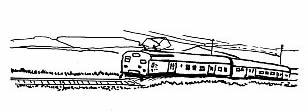
PROLOGUE
FIRST WATCHER
Cape Town, South Africa, July 15 1966
Since his transfer to the Mother City, he had made only three arrests. No charges were laid against the boys putting coins on the tracks at Rondebosh or the old bergie who continued to sleep under the signal box behind the abattoir. The remaining case took three minutes in court, the magistrate fining the old man two rand for spitting off the footbridge at Salt River.
The Cape weather was wet, windy and unpredictable. Damp pervaded everything. His uniform cloak - a shapeless affair of vulcanised rubber - leaked around his thick neck. The serge collar of his tunic was hopelessly distorted, the handcuffs were tarnished and his boots smelled like pilchards.
On Wednesdays he was assigned to the main terminus on Adderly Street. He preferred this to track work. The likelihood of apprehending a criminal was higher where there were crowds, and he could patrol the long platforms without getting wet. He appreciated shelter this Wednesday as a foul northwester hurled ragged sheets of cold water against the building and pounded the waiting trains. Mist obscured the mountain and muffled the sound of foghorns from the harbour.
The station had a littered utilitarian NON WHITE end and a better, well-maintained WHITE end that supported a cafeteria and a newsstand. There was no set routine. He walked the platforms from one extremity to the other. Most of the time he stood around, picking his nose, trying to look vigilant and important.
Racial divisions in Cape Town were as uncertain as the climate. In Johannesburg you knew where you stood. The weather there was hot in summer with occasional thunderstorms, and dry in winter with regular frost. Persons in Johannesburg were white or black with few exceptions, and, generally speaking, the police were white and the crooks were black. Here in the Cape, the weather was unpredictable. There were few black people, and passengers came in a variety of shades. You never knew what they really were.
There were not many passengers on the 11.45 from Paarl. He suspected the woman was a non-white from the moment she disembarked from the front of the train. Frikkie the porter made no attempt to assist her with the heavy suitcase so was clearly of the same opinion. She made her lopsided way to the Adderly street entrance, where she sat on the suitcase watching the traffic outside.
She had no right to be where she waited near the newsstand and opposite the travel bureau. There might be a complaint and he would have forms to fill in. It was prudent not to have a confrontation with her, and experience had taught him that the way to handle these matters was simply to make a show of authority. He positioned himself opposite her, rattled the handcuffs by hitching up his pants and looked straight at her. She did not say anything and she did not move off. She looked directly up at him. She was one of the most beautiful women he had ever seen.
Twenty-five years old and about five foot seven, he estimated. Nice clothes. New takkies. Tiny gold watch. Skin copper brown. Oval face with freckles on the nose. Long eyelashes, high cheekbones and good teeth. Jet-black hair escaped a white headscarf. The mackintosh did not conceal her figure, and a slim ankle with a blue-beaded bracelet showed beneath the hem of her dress. There was a hint of a smile on her lips and clear rebellion in her dark eyes.
It was part of his job to enforce apartheid. He was conditioned not to think of women other than those of European extraction as attractive. The emotions he felt were unnerving and undermined his authority. He was uncertain what to do next.
A sodden pigeon pooped on the floor by his feet and she suppressed a smirk.
His quandary was resolved by events. A new-looking Land Rover with a canvas canopy pulled up in the loading area outside the entrance. The driver - a tall white man with dark hair and mirrored sunglasses - alighted and looked around. The noon gun boomed. The woman stood up with a defiant toss of her head and lugged her suitcase out of the station. The tall man greeted the woman, unlaced the canvas canopy, and shoved the suitcase inside. The cargo area was filled with boxes, and a spade was strapped behind the cab. It was a most suspect vehicle.
The woman removed her coat, lifted her skirt, climbed in through the sheltered driver’s door and slid across to the offside seat. The man got behind the wheel and slammed the door. An astonishing thing then happened. The man kissed the woman. It was more than a quick peck and the action was obvious. The vehicle moved off.
He went directly to his telephone. Sarge answered. ‘I just saw a one-five-seven here, sir. A white ou driving a blue Land Rover bakkie CA 16735. He picked up a coloured woman by the front door and I saw him kissing her before they drove off.’
There was silence at the other end of the line and he heard the captain sigh. Sarge was probably working on the Paarden Island boiler tube case.
‘Jus’ forget about it, Hennie, okay? It’s mos not our priority. Forget about it.’
He consoled himself by smoking a Texan behind the newsstand and resumed his beat at platform three. *
* Seven years after this event took place, a news item appeared
on page five of ‘The Bloemfontein Friend’:

Corporal van der Merwe plays no further role in this narrative.
